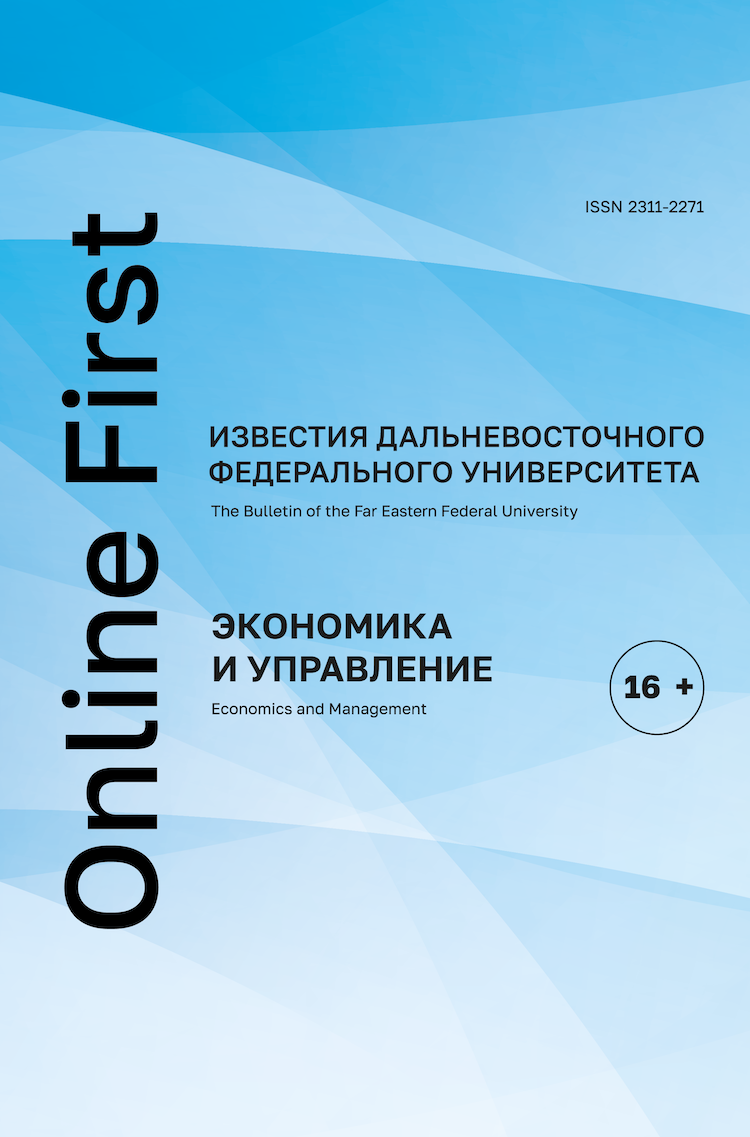Эконометрический анализ факторов числа зарегистрированных коррупционных преступлений в регионах России
Аннотация
Изучены факторы, влияющие на число зарегистрированных коррупционных преступлений в регионах России. Рассмотрены статистические данные по 81 региону с 2008 по 2017 гг. и проведён их регрессионный анализ. В исследовании делается акцент на двойственность изучаемых переменных: с одной стороны, они отражают уровень коррупции в регионах, с другой – усилия правоохранительных органов по борьбе с ней. Выявлено, что на статистику данных преступлений положительно влияют рост инфляции и разница между доходами населения, неоднозначное влияние оказывают ВРП региона на душу населения и доля граждан с высшим образованием. Полученные результаты могут быть использованы для улучшения антикоррупционной политики.
Ключевые слова
Полный текст:
PDFЛитература
Кабанов П.А. Правовые средства обеспечения институционализации государ-ственной политики противодействия коррупции в субъектах Российской Феде-рации: региональный опыт и перспективы развития //Актуальные проблемы российского права. 2014. №8. С.1765-1772. [Kabanov P.A. Pravovye sredstva obespechenija institucionalizacii gosudarstvennoj politiki protivodejstvija korrupcii v sub#ektah Rossijskoj Federacii: regional'nyj opyt i perspektivy razvitija [Legal means of ensuring the institutionalization of the state anti-corruption policy in the constitu-ent entity of the Russian Federation: regional experience and development prospects] Aktual'nye problemy rossijskogo prava = Actual problems of Russian law. 2014, no. 8, pp.1765-1772]
Шорохов В. Е., Перспективы антикоррупционной политики в современной Рос-сии// Гуманитарные науки. Вестник финансового университета. 2019. №9(1). С. 66-70 [Shorohov V. E., Perspektivy antikorrupcionnoj politiki v sovremennoj Rossii [Prospects for anti-corruption policy in modern Russia.] Gumanitarnye nauki. Vestnik finansovogo universiteta = Humanitarian sciences. Financial University Bulletin, 2019, no. 9(1), pp. 66-70]
Moiseev N., Mikhaylov A., Varyash I., Saqib A. Investigating the relation of GDP per capita and corruption index. Entrepreneurship and Sustainability Issues, 2020, vol. 8, no. 1, pp. 780-794. DOI: 10.9770/jesi.2020.8.1(52)
Uslaner E. M., Rothstein B. The Historical Roots of Corruption: State Building, Eco-nomic Inequality and Mass Education. Comparative Politics, 2016, vol. 48, no. 2, pp. 227–248. DOI: 10.5129/001041516817037736
Dutta N., Mukherjee D. Do Literacy and a Mature Democratic Regime Cure Corrup-tion? Journal of Economic Development, 2016, vol. 41, no. 2, pp. 1–26.
Egerton M. Higher Education and Civic Engagement. British Journal of Sociology, 2003, vol. 53, no. 4, pp. 603–620.
Cheung H. Y., Chan A. W. Corruption Across Countries: Impacts from Education and Cultural Dimensions. Social Science Journal, 2008, vol. 45, no. 2, pp. 223–239. DOI: 10.1016/j.soscij.2008.03.002
Botero J., Ponce A., Shleifer A. Education, Complaints and Accountability. Journal of Law and Economics, 2013, vol. 56, no. 4, pp. 959–996. DOI: 10.1086/674133
Goel R. K., Nelson M. A. Measures of corruption and determinants of US corruption. Economics of Governance, 2011, vol. 12, no. 2, pp. 155-176.
Li’an Z., Jing T. Government size, market-orientation and regional corruption: Evi-dence from the provincial level panel data. Frontiers of Economics in China, 2009, vol. 4, no. 3, pp. 425-448. DOI: 10.1007/s11459-009-0023-2
Dininio P., Orttung R. Explaining patterns of corruption in the Russian regions. World Politics, 2005, vol. 57, no. 4, pp. 500-529. DOI: https://doi.org/10.1353/wp.2006.0008
Belousova V., Goel R. K., Korhonen I. Causes of corruption in Russia: a disaggregat-ed analysis. BOFIT DISCUSSION PAPERS, 2011, no. 31, pp. 01-28.
Rose-Ackerman S., Truex R. Corruption and Policy Reform. Yale Law and Econom-ics Research Paper, 2012, no. 444, pp. 217–238.
Meagher P. Anti-Corruption Agencies: Rhetoric Versus Reality. Journal of Policy Re-form, 2005, vol. 8, no. 1, pp. 69–103. DOI: 10.1080/1384128042000328950
Klemenčič G., Stusek, J. Specialised Anti-Corruption Institutions: Review of Models. Paris: OECD Publishing, 2008, 178 p.
Charron N. Mapping and Measuring the Impact of Anti-Corruption Agencies: A New Dataset for 18 Countries // Paper for the Conference organized by the SOG and the QoG «New Public Management and the Quality of Government Conference», Univer-sity of Gothenburg, 2008, pp. 6
Olken B.A. Monitoring Corruption: Evidence from a Field Experiment in Indonesia. Journal of Political Economy, 2007, no. 115(2), pp. 200–249. DOI: 10.1086/517935
Schultz J. The UNCAC and Judicial Corruption: Requirements and Avenues for Re-form. Available at: https://www.u4.no/publications/the-uncac-and-judicial-corruption-requirements-and-avenues-for-reform (accessed 20.10.2020)
Herzfeld T., Weiss C. Corruption and Legal (In) Effectiveness: An Empirical Investi-gation. European Journal of Political Economy, 2003, no. 19(3), pp. 621–632. DOI: 10.1016/S0176-2680(03)00018-1
Themudo N. S. Reassessing the Impact of Civil Society: Nonprofit Sector. Press Freedom and Corruption. Governance, 2013, vol. 26, no. 1, pp. 63–89. DOI: 10.1111/j.1468-0491.2012.01602.x
Brunetti A., Weder B. A Free Press Is Bad News for Corruption. Journal of Public Economics, 2003, vol.87, no. 7, pp. 1801–1824. DOI: 10.1016/S0047-2727(01)00186-4
Dee T. S. Are There Civic Returns to Education? Journal of Public Economics, 2004, vol. 88, no. 9, 1697–1720. DOI: 10.3386/w9588
(c) 2022 Научный журнал "Известия Дальневосточного федерального университета. Экономика и управление"
© Дальневосточный федеральный университет, 1996-2022.
© Научный журнал "Известия Дальневосточного федерального университета Экономика и управление" - 16+.
Свидетельство о регистрации средства массовой информации ПИ № ФС77-57575
Издатель - ФГАОУ ВО "Дальневосточный федеральный университет".
При перепечатке ссылка на Сайт Журнала обязательна.
Коммерческое использование размещенных материалов запрещено.
E-mail: sem-journal@dvfu.ru





